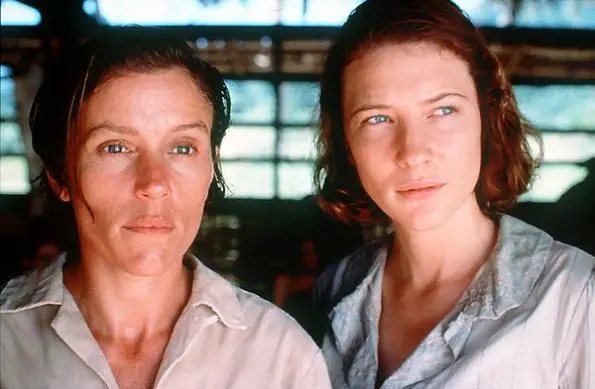After last week, we stay with Cate Blanchett during WW2. This time as an Australian nurse in a Japanese internment camp who becomes part of a voice choir with her fellow prisoners of war in Paradise Road (1997). Hosted by Murtada Elfadl with guest Nathaniel Rogers of The Film Experience.

Subscribe: Apple Podcasts / Stitcher / Spotify / Google / iHeart
What is the film about?
From IMDB: A group of women who are imprisoned on the island of Sumatra by the Japanese during World War II use music to relieve their misery.
Who does Cate play?
Susan McCarthy, an Australian nurse who finds her strength in the internment camp.
How is Cate introduced?
Immediately, the first of the cast to appear. Dancing with a soldier at the ball in Singapore that opens the movie. They are dancing to “Mad about the Boy” as the shelling starts around them.
When did it come out?
April 1997.
Box Office: Domestic = $2MM Int’l = Not available
Critical Response: Metacritic : 48 RT: 48

Topics discussed:
- Sort of a forgotten film. After watching, do we know why?
- One of Cate’s early roles. Does the star quality appear?
- The Chicago Film Critics gave her their most promising actress citation so at least one group noticed the potential.
- All star cast; we discuss the performances of Cate along with Glenn Close, Frances McDormand, Pauline Collins, Jennifer Ehle and Julianna Margulies.
- Bruce Beresford – interesting director or not? Driving Miss Daisy (1989), Double Jeopardy (1999), Crimes of the Heart (1985), Tender Mercies (1983) are his most well known American movies, broke out in Australia with Breaker Morant (1980).
- Though the film is about a group of women, the film divides them in a few silos of two thus undercutting the dramatic tension.
- Critics really came for McDormand and her accent, only a month after her Oscar win.
- The movie is about a voice choir but that’s not revealed until more than 40 mins into it.
- Is it humorous? I wasn’t expecting a dick joke. There’s even a retrograde naked cat fight. Yet the main story is somber and serious. The tone is all over the place.
- Some reviews mentioned that this coming after Schindler’s List (1993) made it redundant.
- The one non white character in the internment camp is killed off first and early.
Scenes we liked:
- Swimming after the shipwreck, looks gorgeous.
- Cate’s scenes with Frances McDormand as her mentor.
Film within context of Cate’s career:
1997 was the first year for Cate in cinema with this film, Thank God He Met Lizzie and Oscar and Lucinda released. Next year she’ll become an international star with Elizabeth.

What reviews said of film / Cate:
Blanchett’s performance was not critiqued in the few reviews I found online.
“In trying to keep track of everybody while providing enough melodrama to sustain an atmosphere of controlled terror, “Paradise Road” stumbles all over itself and never really finds its center. If “Paradise Road” had an extra half-hour to develop its characters, it might have amounted to something more substantial than a series of disconnected little dramas. But despite the strong ensemble acting (Ms. McDormand’s caricatured doctor is a surprising exception), the characters never become full enough for us to care a great deal about who survives and who doesn’t.” – Stephen Holden, NY Times.
“Told this story, and that it was true, you would think it would be enough for a screenplay. But would you be correct? I didn’t want “Paradise Road” to be a melodrama–a “Great Escape,” say, or “Stalag 17” in which the sound of the music distracts from the digging of tunnels. There is not even the possibility of escape, because they are on an island in the middle of a sea controlled by Japan. We realize early on that prison life, within boundaries, will remain much the same until the film’s end. But what the movie lacks is a story arc to pull us through.” – Roger Ebert.
“Every character can be written off with a shorthand description, since none strays beyond a sketch.” – Lisa Schwarzbaum, EW.
Subscribe: Apple Podcasts / Stitcher / Spotify / Google / iHeart
Like? Rate and Review. Have a question? Leave us a comment.
